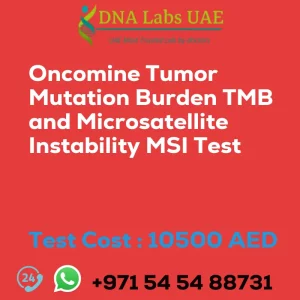Genetic Lab Blog – Solid Tumor Combo2 MSINRASKRASBRAFH RAS Test
Welcome to the DNA Labs UAE blog, where we provide valuable information about genetic testing. In this blog post, we will discuss the Solid Tumor Combo2 MSINRASKRASBRAFH RAS Test and its components, cost, symptoms, diagnosis, and more.
Test Name: Solid Tumor Combo2 MSINRASKRASBRAFH RAS Test
Components:
- Paraffin embedded tissue blocks
- EDTA Vacutainer (2ml)
Price: 7200.0 AED
Sample Condition:
Tumor tissue + Peripheral blood
Report Delivery: 10 days
Method: Sanger Sequencing, Fragment analysis
Test Type: Genetics
Doctor: Gynecologist
Test Department:
Pre Test Information:
The Solid Tumor Combo2 MSINRASKRASBRAFH RAS Test can be done with a doctor’s prescription. Please note that the prescription is not applicable for surgery and pregnancy cases or people planning to travel abroad.
Test Details:
This combination of mutations is commonly found in solid tumors such as colorectal, lung, and pancreatic cancer. The mutations include:
- MSI (microsatellite instability): This is a condition where the DNA replication machinery makes errors in copying short repetitive sequences of DNA. MSI can lead to mutations in genes that control cell growth and division, which can promote cancer development and progression.
- NRAS: This gene is part of the RAS family of genes that encode proteins involved in cell signaling pathways. Mutations in NRAS can cause uncontrolled cell growth and division, leading to cancer.
- KRAS: This gene is also part of the RAS family and plays a similar role in cell signaling. Mutations in KRAS are commonly found in many types of cancer and can contribute to tumor growth and resistance to treatment.
- BRAF: This gene encodes a protein involved in the MAPK/ERK signaling pathway, which regulates cell growth and division. Mutations in BRAF can lead to uncontrolled cell growth and division, promoting cancer development.
- H RAS: This gene is another member of the RAS family and plays a role in cell signaling. Mutations in H RAS can contribute to cancer development and progression.
The presence of these mutations can impact treatment options and prognosis for patients with solid tumors. For example, targeted therapies that block the activity of mutant RAS or BRAF proteins may be effective in some cases. Additionally, MSI status can be used to guide immunotherapy treatment decisions.
Thank you for reading our blog post on the Solid Tumor Combo2 MSINRASKRASBRAFH RAS Test. If you have any further questions or would like to schedule a test, please contact DNA Labs UAE.
| Test Name | Solid tumor Combo2 MSINRASKRASBRAFH RAS Test |
|---|---|
| Components | Paraffin embedded tissue blocks+ EDTA Vacutainer (2ml) |
| Price | 7200.0 AED |
| Sample Condition | Tumor tissue+Peripheral blood |
| Report Delivery | 10 days |
| Method | Sanger Sequencing,Fragment analysis |
| Test type | Genetics |
| Doctor | Gynecologist |
| Test Department: | |
| Pre Test Information | Solid tumor Combo2 MSI,NRAS,KRAS,BRAF,H RAS] can be done with a Doctors prescription. Prescription is not applicable for surgery and pregnancy cases or people planing to travel abroad. |
| Test Details |
This combination of mutations is commonly found in solid tumors such as colorectal, lung, and pancreatic cancer. The mutations include: – MSI (microsatellite instability): This is a condition where the DNA replication machinery makes errors in copying short repetitive sequences of DNA. MSI can lead to mutations in genes that control cell growth and division, which can promote cancer development and progression. – NRAS: This gene is part of the RAS family of genes that encode proteins involved in cell signaling pathways. Mutations in NRAS can cause uncontrolled cell growth and division, leading to cancer. – KRAS: This gene is also part of the RAS family and plays a similar role in cell signaling. Mutations in KRAS are commonly found in many types of cancer and can contribute to tumor growth and resistance to treatment. – BRAF: This gene encodes a protein involved in the MAPK/ERK signaling pathway, which regulates cell growth and division. Mutations in BRAF can lead to uncontrolled cell growth and division, promoting cancer development. – H RAS: This gene is another member of the RAS family and plays a role in cell signaling. Mutations in H RAS can contribute to cancer development and progression. The presence of these mutations can impact treatment options and prognosis for patients with solid tumors. For example, targeted therapies that block the activity of mutant RAS or BRAF proteins may be effective in some cases. Additionally, MSI status can be used to guide immunotherapy treatment decisions. |








